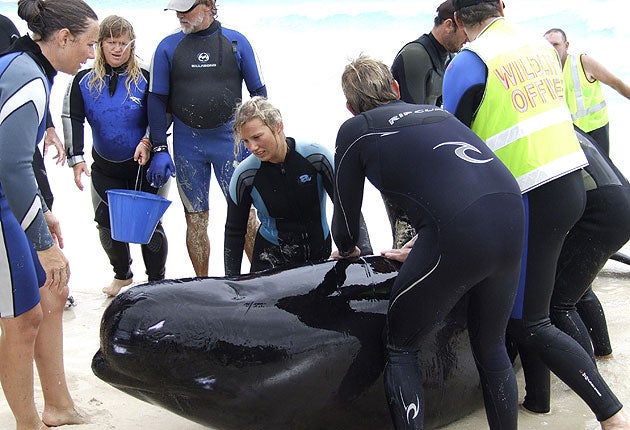Stranded whales returned to sea

Your support helps us to tell the story
From reproductive rights to climate change to Big Tech, The Independent is on the ground when the story is developing. Whether it's investigating the financials of Elon Musk's pro-Trump PAC or producing our latest documentary, 'The A Word', which shines a light on the American women fighting for reproductive rights, we know how important it is to parse out the facts from the messaging.
At such a critical moment in US history, we need reporters on the ground. Your donation allows us to keep sending journalists to speak to both sides of the story.
The Independent is trusted by Americans across the entire political spectrum. And unlike many other quality news outlets, we choose not to lock Americans out of our reporting and analysis with paywalls. We believe quality journalism should be available to everyone, paid for by those who can afford it.
Your support makes all the difference.Ten long-finned pilot whales were returned to sea today after surviving a mass stranding on a remote southwest Australian beach and appeared to be swimming away after some initial disorientation, an official said.
One whale was euthanised on the beach after its condition deteriorated during the course of the day, said Greg Mair, incident controller at the Western Australia Department of Environment and Conservation.
"In addition to the importance of ensuring the most humane outcome for the individual animal, one of the most important considerations was reducing the likelihood of negatively affecting the rest of the pod," Mair said in a statement.
Officials had feared that the rescued pod would respond to the sick whale's distress signal by returning to the beach.
Mair said the 10 whales appeared to be moving into deeper waters. Aerial surveillance of the pod would continue tomorrow, he said.
The animals had been trucked overland in the morning to a bay with deeper waters in an attempt to save them after nearly 70 others died when they beached themselves early yesterday in Western Australia state.
Rescuers moved them out 100 yards (metres) to sea in Flinders Bay, but the whales initially began moving back to shore. Sinclair said that was not unusual and that rescuers on Jet Skis, boats and surfboards redirected them.
The group of 87 whales and five bottlenose dolphins beached themselves early yesterday in Hamelin Bay. One dolphin and 72 whales died before they could be rescued.
Volunteers and government employees worked all day and overnight to stabilize the survivors, keeping them wet and moving them into one pod in a safe holding area with slightly deeper water.
Most beached whales die of dehydration, overheating or from their weight, which can crush their internal organs once they leave the weightlessness of the water.
Rough seas and high waves hampered the rescue effort at Hamelin Bay and officials decided to move the surviving animals overland to deeper, more protected waters in Flinders Bay, about 12 miles (20 kilometres) away.
Four whales and four dolphins were pushed back to sea before the move, Sinclair said.
The remaining 11 whales — which measure up to 20 feet (6 metres) long and weigh up to 3.5 tons — were loaded into trucks by slings and individually transported to the new location this morning.
It was the latest mass beaching of whales in Australia. Strandings happen periodically in Tasmania, in the southeast, as whales pass during their migration to and from Antarctic waters, but scientists do not know why.
Department staff and scientists took measurements and DNA samples from the dead whales and dolphins to allow scientists to assess the genetic information and population structure of the pod. The dead whales will be transported to a nearby waste disposal area.
Earlier this month, 194 pilot whales and seven dolphins became stranded on a sandbar in Tasmania and only 54 whales and five dolphins were able to be saved. In January, 45 sperm whales died after becoming beached on a different Tasmanian sandbar. There were also two mass strandings in Tasmania last November.
Join our commenting forum
Join thought-provoking conversations, follow other Independent readers and see their replies
Comments